 Petzlover
Petzlover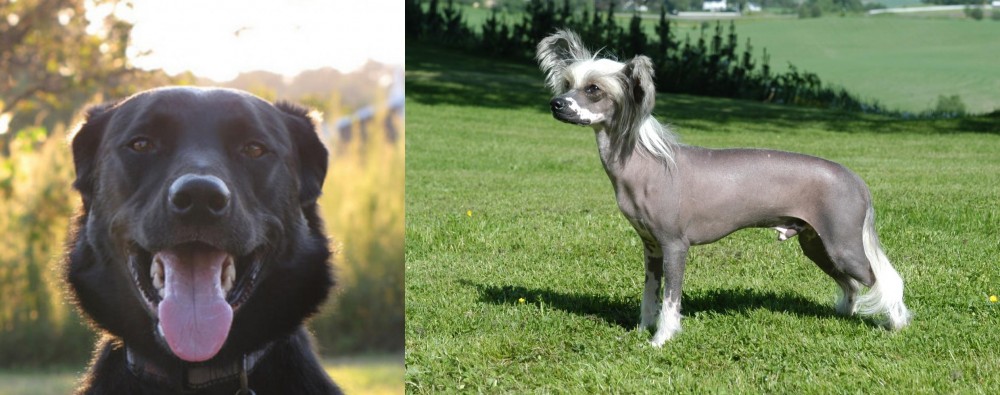 Borador is originated from United States but Chinese Crested Dog is originated from Mexico. Borador may grow 27 cm / 11 inches higher than Chinese Crested Dog. Borador may weigh 21 kg / 47 pounds more than Chinese Crested Dog. Both Borador and Chinese Crested Dog has almost same life span. Borador may have more litter size than Chinese Crested Dog. Borador requires Moderate Maintenance. But Chinese Crested Dog requires Low Maintenance
Borador is originated from United States but Chinese Crested Dog is originated from Mexico. Borador may grow 27 cm / 11 inches higher than Chinese Crested Dog. Borador may weigh 21 kg / 47 pounds more than Chinese Crested Dog. Both Borador and Chinese Crested Dog has almost same life span. Borador may have more litter size than Chinese Crested Dog. Borador requires Moderate Maintenance. But Chinese Crested Dog requires Low Maintenance
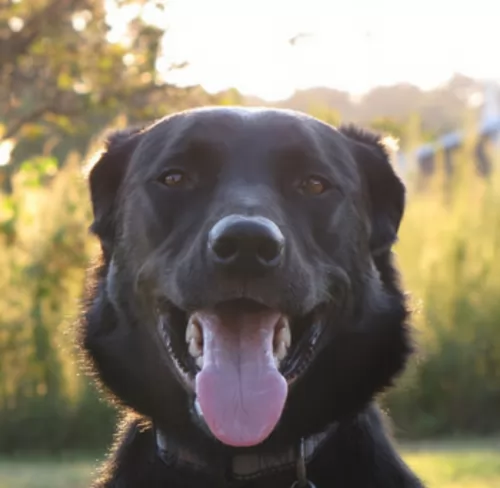 Hybrid breeds have become popular in the last decade or so. The Borador, hailing from Northern America, is one of these popular crossbreeds between two very popular dog breeds - the Border Collie and the Labrador Retriever. Between the two dog breeds, you get extraordinary intelligence, energy and a wonderful temperament.
Hybrid breeds have become popular in the last decade or so. The Borador, hailing from Northern America, is one of these popular crossbreeds between two very popular dog breeds - the Border Collie and the Labrador Retriever. Between the two dog breeds, you get extraordinary intelligence, energy and a wonderful temperament.
You first started hearing about this dog breed in the early 21st century. However each of the two breeds brought together to produce the Borador have got reasonable lengthy histories.
 The Chinese Crested Dog is believed to have its origins in Africa and there are many texts from the 19th Century that feature an Africa Hairless Terrier that resembles the Chinese Crested. However, the scientific and genetic evidence leads to an origin that is shared with the Mexican Hairless Dog. Any way you look at it the dog did not originate in China. The Chinese were very fond of this breed and used them on their ships to control the rat populations. This is probably how they got their name.
The Chinese Crested Dog is believed to have its origins in Africa and there are many texts from the 19th Century that feature an Africa Hairless Terrier that resembles the Chinese Crested. However, the scientific and genetic evidence leads to an origin that is shared with the Mexican Hairless Dog. Any way you look at it the dog did not originate in China. The Chinese were very fond of this breed and used them on their ships to control the rat populations. This is probably how they got their name.
There are two types of Chinese Crested Dogs – the well known Hairless, and the lesser known Powderpuff. The Hairless type is better known because they carry the dominant trait and the Powderpuff is recessive. However, this recessive gene is carried by every Chinese Crested Dog so the Powderpuff can show up in all litters even those of two Hairless Crested. Two Powderpuffs will not result in any Hairless in their litters as the Powderpuff does not have the gene for the Hairless.
The “Crest Haven” Kennel was opened by Debora Wood in the 1950’s to breed the Chines Crested Dog. At the same time Gypsy Rose Lee, of the famous burlesque shows, was also breeding Chinese Crested Dogs. The two lines of Crested bred by Americans came together following the death of Rose Lee. Every Chinese Crested that lives today can trace their heritage directly to these two breeding lines. In 1959, Debra Wood founded the American Hairless Dog Club which became a part of the American Chinese Crested Club or the ACCC in 1978. This organization then became the breed’s parent club after AKC (American Kennel Club) recognized the breed in 1991. Prior to this the Federation Cynologique Internationale, recognized the breed in 1987, the United Kingdom (UK)the Kennel Club recognized them in 1981 and the Australian National Kennel Council recognized the Crested in 1995.
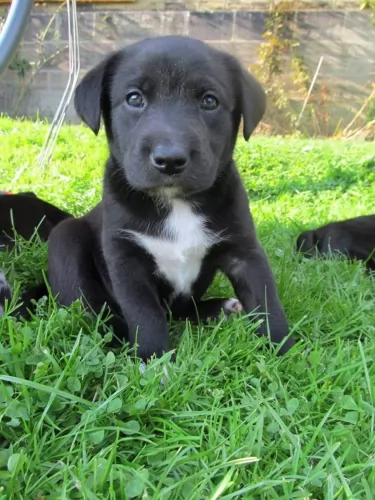 The Borador is a medium to large sized working dog which is well well-proportioned and muscular. His size can’t be carved in stone, but generally he will be in size from 40 – 57cm and weight in the region of 18 and 26 kg. His coat can vary significantly, leaning more towards one particular breed than the other. So the coat can be short and smooth or long and wavy or straight.
The Borador is a medium to large sized working dog which is well well-proportioned and muscular. His size can’t be carved in stone, but generally he will be in size from 40 – 57cm and weight in the region of 18 and 26 kg. His coat can vary significantly, leaning more towards one particular breed than the other. So the coat can be short and smooth or long and wavy or straight.
The Borador essentially has medium-sized ears which are floppy and the tail is medium-length. Sometimes the Borador will have the black and white coat of the Border Collie or he could have a brownish/beige colour from a golden Labrador.
When your energetic Borador is trained and socialized, he becomes a great family member and he gets on well with children and other pets.You’ll find that he often has the sweet, amicable temperament of the Labrador while having the sharp, alert intellect of the Border Collie.
Most Boradors are also good watchdogs and will bark at strangers, but because they are so amicable, from barking, they can quickly become a stranger’s friend.
 This is a toy breed and very small. The Hairless and the Powderpuff are two types of the same breed, although they do not look like it. The Hairless type can have fur anywhere on its body, but it will not have much. It will have hair on its paws, tail and head. The Powderpuff on the other hand will have a thick double coat. When discussing the color of the hairless, one is referring to the color of its skin. It can range from flesh to black.
This is a toy breed and very small. The Hairless and the Powderpuff are two types of the same breed, although they do not look like it. The Hairless type can have fur anywhere on its body, but it will not have much. It will have hair on its paws, tail and head. The Powderpuff on the other hand will have a thick double coat. When discussing the color of the hairless, one is referring to the color of its skin. It can range from flesh to black.
The Powderpuff has a soft, thick, straight double coat. It can have very long hair. The Hairless must have its skin taken care of and protected. Both types of Chines Crested are small in stature with well proportioned, athletic bodies.
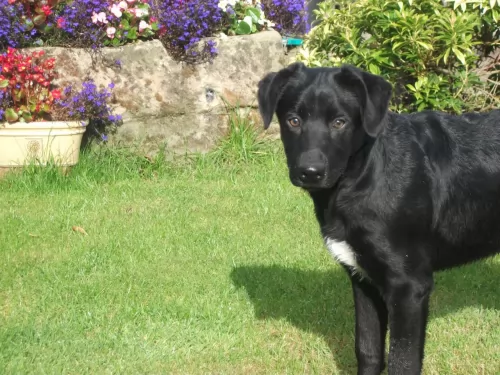 The Borador is an intelligent dog that can be trained. He is a sociable dog and is friendly to all members of his human family, willing to extend a paw of friendship to strangers as well.
The Borador is an intelligent dog that can be trained. He is a sociable dog and is friendly to all members of his human family, willing to extend a paw of friendship to strangers as well.
The Borador is also a friend of children and other pets. This combination of breeds is very energetic and you can’t just leave him for days on end in the backyard. He will need exercise and walks as well as ball games. When you become involved in his games, you tighten the bond between you and this is what this social, outgoing dog loves.
The Borador is going to make a wonderful pet because he is a mix of two very popular dog breeds. Give him all he deserves as a member of your family and you’ll have the perfect friend and companion for life.
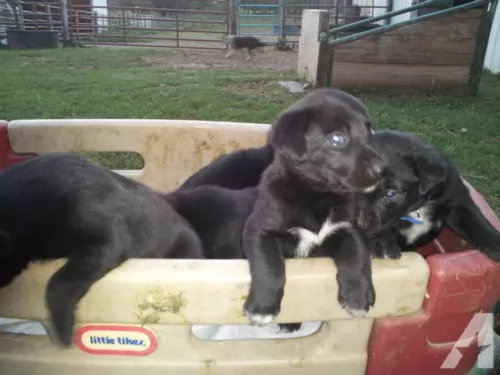 You won’t find serious health problems with your Boradors, as he is a robust breed. Nonetheless, there are some ailments that as a dog owner, you need to be aware of for your Borador.
You won’t find serious health problems with your Boradors, as he is a robust breed. Nonetheless, there are some ailments that as a dog owner, you need to be aware of for your Borador.
Skin ailments – you don’t want to see your dog scratching or licking continuously so you want to be aware of things like parasites and allergies. Skin diseases can be debilitating for a dog and can even require lifelong treatments. Yes, corticosteroids can help with itchy rashes, but the best move is to try and avoid skin ailments by ensuring a nutritious diet rich in minerals and vitamins and which includes some raw meat.
Always be checking your pet for skin problems such as ringworm, caused by a fungus and found on your dog and which appear as scaly patches and hair loss.
Hip Dysplasia – an inherited problem with the hip joints. No-one can predict when hip dysplasia settles in, but it can be as early as 4 months of age.Your dog shows signs of stiffness and may not be his energetic self. Some dog owners want to see certificates first that the parents of puppies have been hip-cleared before they buy a puppy.
 The Chinese Crested Hairless version must have its skin take care of much in the same way we take care of our own. It will burn if exposed to too much sun without protection. They can suffer from dry skin, acne, need moisturizing cremes. They get skin allergies as well and it is important to take care of the skin instead of the brushing you don’t have to do.
The Chinese Crested Hairless version must have its skin take care of much in the same way we take care of our own. It will burn if exposed to too much sun without protection. They can suffer from dry skin, acne, need moisturizing cremes. They get skin allergies as well and it is important to take care of the skin instead of the brushing you don’t have to do.
The Chinese Crested does not suffer from most of the diseases other toy breeds do. They can have ye issues. The Hairless have a “primitive mouth” . They have pointy teeth and poor dentition. This is not true of the Powderpuffs however. Their eye issues include:
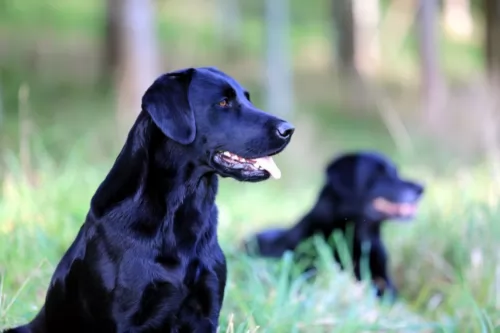 The Borador may have inherited the moderate shedder characteristics of the Border Collie or the more intense shedding of the Labrador Retriever. He will require a good brush at least twice a week to ensure you remove loose hairs so as to keep his coat shiny and healthy. Check your dogs ears too for yeast infections.
The Borador may have inherited the moderate shedder characteristics of the Border Collie or the more intense shedding of the Labrador Retriever. He will require a good brush at least twice a week to ensure you remove loose hairs so as to keep his coat shiny and healthy. Check your dogs ears too for yeast infections.
Puppies and young Boradors are full of energy and they will require a diet that has an excellent protein content. If you’re unsure about how to feed your Borador, speak to your vet as some dogs need more calories depending on their level of activity.
Certainly if your dog has allergies, you may have to look for a special diet but otherwise a top brand commercial dog food can be a good choice if you include some home prepared food such as rice, vegetables and meat. It is important to give your dog some raw meat every now and then as well. Always have a bowl of cool, fresh water available for your pet 24/7.
 Like several other toy breeds, it is easy to overfeed the Chinese Crested because it has such a small stature. Feed once or twice a day but never more than one fourth of a cup total for the day.
Like several other toy breeds, it is easy to overfeed the Chinese Crested because it has such a small stature. Feed once or twice a day but never more than one fourth of a cup total for the day.
Luxating Patellas – kneecaps move out of place and cause lameness and arthritis
Legg-Perthes Disease – a hip disorder where blood does not reach the head of the femur. The bone dies, and growth stops.
Canine Multiple System Degeneration (CMSD) – a progressive movement disorder can call falls
This Breed does not need an excessive amount of exercise, but they do enjoy running. They are competitive and athletic, so they can excel at flyball, lure coursing, agility and obedience. They are sensitive and trainable enough to become a therapy dog.